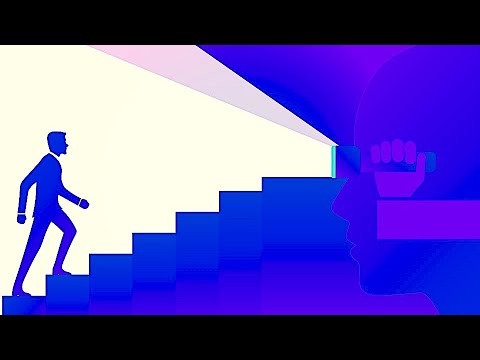Closer To Truth
Some claim consciousness, our inner awareness, is part of a ‘cosmic consciousness’. Not only is consciousness the deepest reality, but also it brought into existence the totality of reality. This would mean that mind, the mental, is fundamental and primary, while the entire physical universe is derivative and secondary.
Click here to watch more interviews on consciousness and the cosmos http://bit.ly/29lHrkG
Click here to watch more interviews with Menas Kafatos http://bit.ly/29hEobJ
Click here to buy episodes or complete seasons of Closer To Truth http://bit.ly/1LUPlQS
For all of our video interviews please visit us at www.closertotruth.com
Source




I predicted his position on panpsychism when I saw his hat.
Too much LSD
Understanding Carl Sagan's definition of cosmos ( as opposed to simply the universe ) which he explained means All there is, ever was or will ever be consciousness can't cause the cosmos because it too is cosmos & the cosmos i.e. Everything there is known or unknown can't cause itself can it?
Do people really belive this crap?!?!
Is you one wants to experience consciousness…. walk the Advaita Vedanta path. Consciousness can be experienced but cannot be intellectually defined. It is the Ocean from which all forms, like waves, arise…live our lives, and go back to.
I like that this reality has been talked about since ancient times just didnt have the ability to study it. I'm agnostic, but it hit me hard that in the beginning was the word and the word was with god and the word was god
"Closer To Truth" episodes = Is A > B, Is A < B, is A = B, did A cause B, did B cause A, did A and B cause each other, did A and B both emergent from C, are A and B both illusions, so on and so forth. Its fun to watch but after hundreds of episodes, nothing has been resolved and we ae back to square one.
Chopra & Kafatos = brothers separated at birth but reconnected by "consciousness". Hehehehe.
I agree with everything he said here.
Of course this guy is wearing a beret.
Non-duality, my friends.
So good
Thank you!
In objective reality rainbows don't exist but there is potential for an infinite amount of them to be experience at each event, depending on your viewpoint. My rainbow only exists in my mind and will be in a different position to the rainbow seen by someone else. Same with the universe, every universe only exists in our minds, there is no objective universe.
No
Ego gives rise. That's a fact
If you get a chance, please interview Swami Sarvapriyananda.. would get answers from Vedanta/Upanishads explaining this for ages
Consciousness stops all of the time and the universe persists. This is only 1 thing. There is nothing except the one. We are an actor in a play. Your dialogue is prewritten. Choice exists, but only on a trivial level. The story has to end as it is prewritten, or it is being spun freestyle, improvised in the moment. Maybe god is a rapper of some sort.
most of the time menas is talking about "consciousness of the universe" and robert is talking about "consciousness of a human being"… bernardo kastrup tries to be more clear using terms such as mind at large (counsciousness of the universe) and "personal counsciousness" and he likes to create metaphors such as mind at large is like the lake and each personal counsciousness would be an whirl/vortex in that "lake" meaning that we are the same stuff as the "Mind at large"; Then there is the problem of how all these "things" presents themselves and/or how they are perceived… without a minimum vocabulary negotiation the result is this video!
I am a physicist and I will provide solid arguments that prove that consciousness cannot be generated by the brain (in my youtube channel you can find a video with more detailed explanations). Many argue that consciousness is an emergent property of the brain, but it is possible to show that such hypothesis is inconsistent with our scientific knowledges. In fact, it is possible to show that all the examples of emergent properties consists of concepts used to describe how an external object appear to our conscious mind, and not how it is in itself, which means how the object is independently from our observation.
Let me show this with an example of emergent property, such as the function of a biological organ, like the heart that has the function of pumping blood. Actually, the function of pumping blood is just an abstract concept through which we approximately describe what is really happening, that is billions of linked chemical reactions and moving molecules. In other words, the function of the heart is only a subjective description of the organ from a macroscopic point of view, which neglect many microscopic details. Besides, the concept of pumping is directly connected to the concepts of force and movement, which are fundamental physical properties. Therefore, the function of the heart is not a new real property, but only a conceptual model through which we approximately describe the reality; this means that the function of the heart is just an idea. Emergent properties are ideas conceived to describe or classify, according to arbitrary criteria and from an arbitrary point of view, certain processes or systems; emergent properties are intrinsically subjective, since they are conceptual models based on the arbitrary choice to focus on certain aspects of a system and neglet other aspects, such as microscopic structures and processes; emergent properties consist of ideas through which we describe how the external reality appears to our conscious mind: without a conscious mind, these ideas (= emergent properties) would not exist at all.
Here comes my first argument: arbitrariness, subjectivity, classifications and approximate descriptions, imply the existence of a conscious mind, which can arbitrarily choose a specific point of view and focus on certain aspects while neglecting others. It is obvious that consciousness cannot be considered an emergent property of the physical reality, because consciousenss is a preliminary necessary condition for the existence of any emergent property. We have then a logical contradiction. Nothing which presupposes the existence of consciousness can be used to try to explain the existence of consciousness.
Here comes my second argument: our scientific knowledge shows that brain processes consist of sequences of ordinary elementary physical processes; since consciousness is not a property of ordinary elementary physical processes, then a succession of such processes cannot have cosciousness as a property. In fact we can break down the process and analyze it step by step, and in every step consciousness would be absent, so there would never be any consciousness during the entire sequence of elementary processes. It must be also understood that considering a group of elementary processes together as a whole is an arbitrary choice. In fact, according to the laws of physics, any number of elementary processes is totally equivalent. We could consider a group of one hundred elementary processes or ten thousand elementary processes, or any other number; this choice is arbitrary and not reducible to the laws of physics. However, consciousness is a necessary preliminary condition for the existence of arbitrary choices; therefore consciousness cannot be a property of a sequence of elementary processes as a whole, because such sequence as a whole is only an arbitrary and abstract concept that cannot exist independently of a conscious mind.
Here comes my third argument: It should also be considered that brain processes consist of billions of sequences of elementary processes that take place in different points of the brain; if we attributed to these processes the property of consciousness, we would have to associate with the brain billions of different consciousnesses, that is billions of minds and personalities, each with its own self-awareness and will; this contradicts our direct experience, that is, our awareness of being a single person who is able to control the voluntary movements of his own body with his own will. If cerebral processes are analyzed taking into account the laws of physics, these processes do not identify any unity; this missing unit is the necessarily non-physical element (precisely because it is missing in the brain), the element that interprets the brain processes and generates a unitary conscious state, that is the human mind.
Here comes my forth argument: Consciousness is characterized by the fact that self-awareness is an immediate intuition that cannot be broken down or fragmented into simpler elements. This characteristic of consciousness of presenting itself as a unitary and non-decomposable state, not fragmented into billions of personalities, does not correspond to the quantum description of brain processes, which instead consist of billions of sequences of elementary incoherent quantum processes. When someone claims that consciousness is a property of the brain, they are implicitly considering the brain as a whole, an entity with its own specific properties, other than the properties of the components. From the physical point of view, the brain is not a whole, because its quantum state is not a coherent state, as in the case of entangled systems; the very fact of speaking of "brain" rather than many cells that have different quantum states, is an arbitrary choice. This is an important aspect, because, as I have said, consciousness is a necessary preliminary condition for the existence of arbitrariness. So, if a system can be considered decomposable and considering it as a whole is an arbitrary choice, then it is inconsistent to assume that such a system can have or generate consciousness, since consciousness is a necessary precondition for the existence of any arbitrary choice. In other words, to regard consciousness as a property ofthe brain, we must first define what the brain is, and to do so we must rely only on the laws of physics, without introducing arbitrary notions extraneous to them; if this cannot be done, then it means that every property we attribute to the brain is not reducible to the laws of physics, and therefore such property would be nonphysical. Since the interactions between the quantum particles that make up the brain are ordinary interactions, it is not actually possible to define the brain based solely on the laws of physics. The only way to define the brain is to arbitrarily establish that a certain number of particles belong to it and others do not belong to it, but such arbitrariness is not admissible. In fact, the brain is not physically separated from the other organs of the body, with which it interacts, nor is it physically isolated from the external environment, just as it is not isolated from other brains, since we can communicate with other people, and to do so we use physical means, for example acoustic waves or electromagnetic waves (light). This necessary arbitrariness in defining what the brain is, is sufficient to demonstrate that consciousness is not reducible to the laws of physics. Besides, since the brain is an arbitrary concept, and consciousness is the necessary preliminary condition for the existence of arbitrariness, consciousness cannot be a property of the brain. Based on these considerations, we can exclude that consciousness is generated by brain processes or is an emergent property of the brain. Marco Biagini
I would love to see the equation that proves his hypothesis. If there is a multiverses, why would a universe without a consciousness would be irrelevant. If a universe without a consciousness existed, then suddenly has a consciousness entered that universe, would it suddenly exist, did it exist before hand?
Sorry, its not been explained well enough for me to think, mmmm OK
I had an operation, and the Anaesthetist knocked me out. Now, the drugs totally disrupted the function of the my brain. I lost consciousness, until I work up. Totally different from sleep.
Can we blame this Menos dude (If you contemplate being a mermaid then part of you is a mermaid) for the more than annoying progressive identity politics?
I'm conscious of the incredible garden he's growing on his ears.
The consciousness that "causes" the universe and indeed, even exists if the universe doesn't – "…in a fundamental way, the universe can go away and consciousness is still there." – is God.
That took a big leap, how would consciousness still be here if the universe were to evaporate? It sounds like your consciousness will still be here if your body were to evaporate. That doesn't really happen you stop experiencing things once you're dead.
Senseless bullshit…a bunch of mumbo jumbo, just a play of words.
Consciousness is the best fit of reality
Why recorded under construction? It's a sign! 🤔🤔🤔